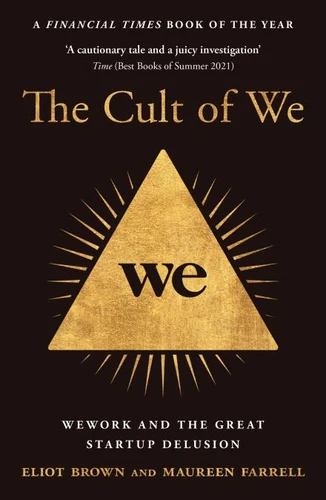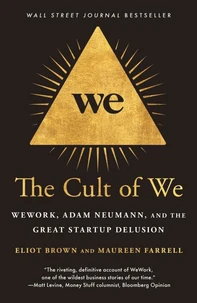The Cult of We. WeWork and the Great Start - Up Delusion
Par : ,Formats :
Disponible dans votre compte client Decitre ou Furet du Nord dès validation de votre commande. Le format ePub protégé est :
- Compatible avec une lecture sur My Vivlio (smartphone, tablette, ordinateur)
- Compatible avec une lecture sur liseuses Vivlio
- Pour les liseuses autres que Vivlio, vous devez utiliser le logiciel Adobe Digital Edition. Non compatible avec la lecture sur les liseuses Kindle, Remarkable et Sony
- Non compatible avec un achat hors France métropolitaine
 , qui est-ce ?
, qui est-ce ?Notre partenaire de plateforme de lecture numérique où vous retrouverez l'ensemble de vos ebooks gratuitement
Pour en savoir plus sur nos ebooks, consultez notre aide en ligne ici
- Nombre de pages464
- FormatePub
- ISBN978-0-00-838941-3
- EAN9780008389413
- Date de parution22/07/2021
- Protection num.Adobe DRM
- Infos supplémentairesepub
- ÉditeurMudlark
Résumé
'An amazing portrait of how grifters came to be called visionaries and high finance lost its mind.' Charles Duhigg, bestselling author of The Power of Habit
The definitive inside story of WeWork, its audacious founder, and the company's epic unravelling from the journalists who first broke the story wide open.
In 2001, Adam Neumann arrived in New York after five years as a conscript in the Israeli navy.
Just over fifteen years later, he had transformed himself into the charismatic CEO of a company worth $47 billion. With his long hair and feel-good mantras, the six-foot-five Neumann looked the part of a messianic Silicon Valley entrepreneur. The vision he offered was mesmerizing: a radical reimagining of work space for a new generation. He called it WeWork. As billions of funding dollars poured in, Neumann's ambitions grew limitless.
WeWork wasn't just an office space provider; it would build schools, create cities, even colonize Mars. In pursuit of its founder's vision, the company spent money faster than it could bring it in. From his private jet, sometimes clouded with marijuana smoke, the CEO scoured the globe for more capital but in late 2019, just weeks before WeWork's highly publicized IPO, everything fell apart. Neumann was ousted from his company, but still was poised to walk away a billionaire. Calling to mind the recent demise of Theranos and the hubris of the dotcom era bust, WeWork's extraordinary rise and staggering implosion were fueled by disparate characters in a financial system blind to its risks.
Why did some of the biggest names in banking and venture capital buy the hype? And what does the future hold for Silicon Valley 'unicorns'? Wall Street Journal reporters Eliot Brown and Maureen Farrell explore these questions in this definitive, rollicking account of WeWork's boom and bust.
Just over fifteen years later, he had transformed himself into the charismatic CEO of a company worth $47 billion. With his long hair and feel-good mantras, the six-foot-five Neumann looked the part of a messianic Silicon Valley entrepreneur. The vision he offered was mesmerizing: a radical reimagining of work space for a new generation. He called it WeWork. As billions of funding dollars poured in, Neumann's ambitions grew limitless.
WeWork wasn't just an office space provider; it would build schools, create cities, even colonize Mars. In pursuit of its founder's vision, the company spent money faster than it could bring it in. From his private jet, sometimes clouded with marijuana smoke, the CEO scoured the globe for more capital but in late 2019, just weeks before WeWork's highly publicized IPO, everything fell apart. Neumann was ousted from his company, but still was poised to walk away a billionaire. Calling to mind the recent demise of Theranos and the hubris of the dotcom era bust, WeWork's extraordinary rise and staggering implosion were fueled by disparate characters in a financial system blind to its risks.
Why did some of the biggest names in banking and venture capital buy the hype? And what does the future hold for Silicon Valley 'unicorns'? Wall Street Journal reporters Eliot Brown and Maureen Farrell explore these questions in this definitive, rollicking account of WeWork's boom and bust.
'An amazing portrait of how grifters came to be called visionaries and high finance lost its mind.' Charles Duhigg, bestselling author of The Power of Habit
The definitive inside story of WeWork, its audacious founder, and the company's epic unravelling from the journalists who first broke the story wide open.
In 2001, Adam Neumann arrived in New York after five years as a conscript in the Israeli navy.
Just over fifteen years later, he had transformed himself into the charismatic CEO of a company worth $47 billion. With his long hair and feel-good mantras, the six-foot-five Neumann looked the part of a messianic Silicon Valley entrepreneur. The vision he offered was mesmerizing: a radical reimagining of work space for a new generation. He called it WeWork. As billions of funding dollars poured in, Neumann's ambitions grew limitless.
WeWork wasn't just an office space provider; it would build schools, create cities, even colonize Mars. In pursuit of its founder's vision, the company spent money faster than it could bring it in. From his private jet, sometimes clouded with marijuana smoke, the CEO scoured the globe for more capital but in late 2019, just weeks before WeWork's highly publicized IPO, everything fell apart. Neumann was ousted from his company, but still was poised to walk away a billionaire. Calling to mind the recent demise of Theranos and the hubris of the dotcom era bust, WeWork's extraordinary rise and staggering implosion were fueled by disparate characters in a financial system blind to its risks.
Why did some of the biggest names in banking and venture capital buy the hype? And what does the future hold for Silicon Valley 'unicorns'? Wall Street Journal reporters Eliot Brown and Maureen Farrell explore these questions in this definitive, rollicking account of WeWork's boom and bust.
Just over fifteen years later, he had transformed himself into the charismatic CEO of a company worth $47 billion. With his long hair and feel-good mantras, the six-foot-five Neumann looked the part of a messianic Silicon Valley entrepreneur. The vision he offered was mesmerizing: a radical reimagining of work space for a new generation. He called it WeWork. As billions of funding dollars poured in, Neumann's ambitions grew limitless.
WeWork wasn't just an office space provider; it would build schools, create cities, even colonize Mars. In pursuit of its founder's vision, the company spent money faster than it could bring it in. From his private jet, sometimes clouded with marijuana smoke, the CEO scoured the globe for more capital but in late 2019, just weeks before WeWork's highly publicized IPO, everything fell apart. Neumann was ousted from his company, but still was poised to walk away a billionaire. Calling to mind the recent demise of Theranos and the hubris of the dotcom era bust, WeWork's extraordinary rise and staggering implosion were fueled by disparate characters in a financial system blind to its risks.
Why did some of the biggest names in banking and venture capital buy the hype? And what does the future hold for Silicon Valley 'unicorns'? Wall Street Journal reporters Eliot Brown and Maureen Farrell explore these questions in this definitive, rollicking account of WeWork's boom and bust.




